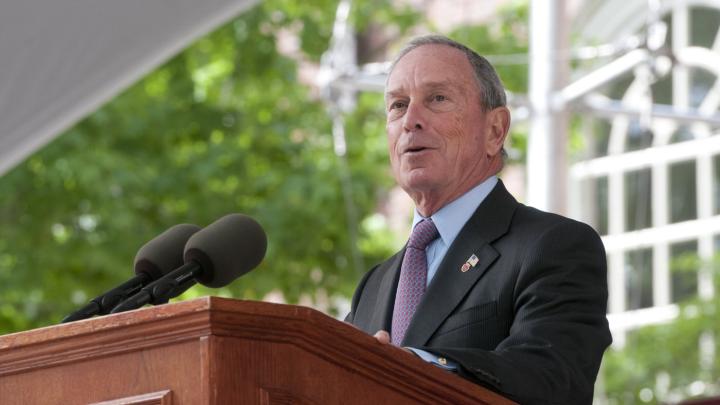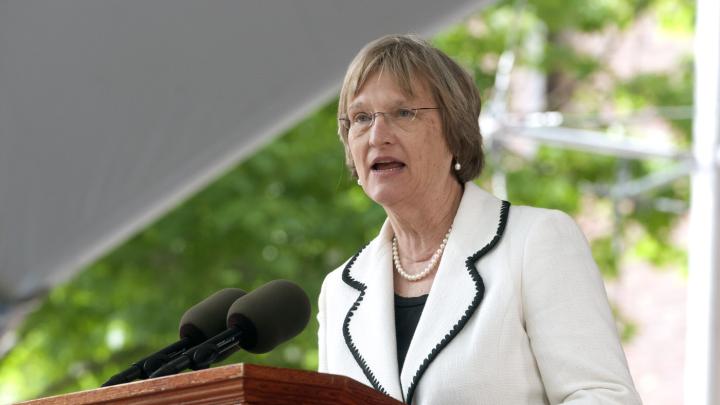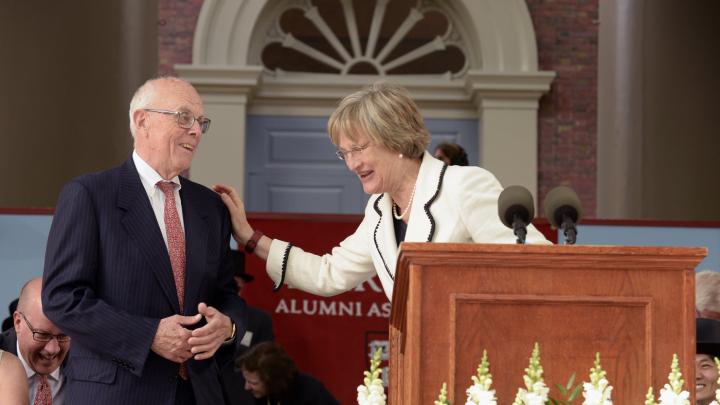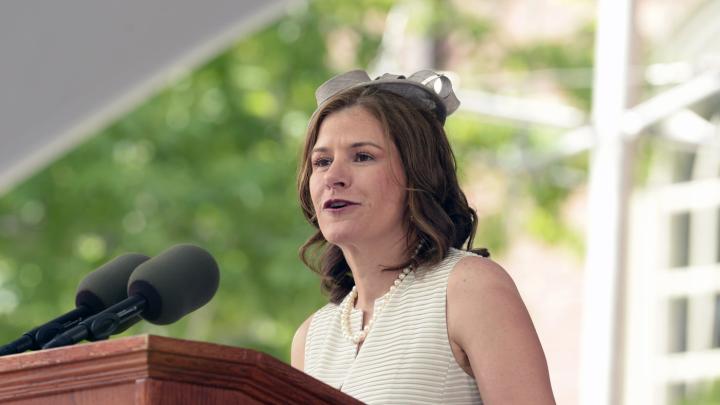President Drew Faust and entrepreneur, philanthropist, and former mayor of New York City Michael R. Bloomberg, M.B.A. ’66, and newly minted LL.D. ’14, spoke during the afternoon program following Harvard’s 363rd Commencement exercises (view the program here).
Bloomberg delivered a roundhouse address defending the free and open exchange of ideas, in civic discourse and within universities. Faust, who spoke first, focused on universities’ obligations to the future, through discovery, the generation of new questions, and meaning—in effect, talking about the purposes of such discourse within academic communities.
President Faust: “We owe the future answers. We owe the future questions. We owe the future meaning.”
Faust, reprising her 2007 installation address's themes of universities’ obligation to the past, the present, and the future (and refining the themes from her Harvard Campaign kickoff address last September), set the stage for her remarks today by summoning Tercentenary Theatre’s storied history. But she then turned to her current concern, “our accountability to the future, because these obligations must be ‘our compass to steer by,’ our common purpose and our shared commitment. What does Harvard—what do universities—owe the future?” She detailed three answers to her own question:
First, we owe the world answers.
Discovery is at the heart of what universities do. Universities engage faculty and students across a range of disciplines in seeking solutions to problems that may have seemed unsolvable, in endeavoring to answer questions that threaten to elude us. The scientific research undertaken today at Harvard, and tomorrow by the students we educate, has a capacity to improve human lives in ways virtually unimaginable even a generation ago. In the last year alone, Harvard researchers have solved riddles related to the treatment of Alzheimer’s disease, the cost-effective production of malaria vaccine, and the origins of the universe.
Second, she continued, “we owe the world questions.” She expanded:
Just as questions yield answers, answers yield questions. Human beings may long for certainty, but, as Oliver Wendell Holmes put it, “certainty generally is illusion, and repose is not the destiny of man.” Universities produce knowledge. They must also produce doubt. The pursuit of truth is restless. We search for answers not by following prescribed paths, but by finding the right questions—by answering one question with another question, by nurturing a state of mind that is flexible and alert, dissatisfied and imaginative. It’s what universities are designed to do. In an essay in Harvard Magazine, one of today’s graduates, Cherone Duggan [a former Ledecky Undergraduate Fellow at the magazine], wrote about what she called seeking “an education of questions.” I hope we have indeed given her that.

Photograph by Stu Rosner
Cherone Duggan ’14
Such questions, she said, “are also the foundation for a third obligation that we as a university owe the future: we owe the world meaning.” By this, she meant,
Universities must nurture the ability to interpret, to make critical judgments, to dare to ask the biggest questions, the ones that reach well beyond the immediate and the instrumental. We must stimulate the appetite for curiosity.
We find many of these questions in the humanities: What is good? What is just? How do we know what is true? But we find them in the sciences as well. Can there be any question more profound, more fundamental than to ask about the origins of the universe? How did we get here?
Questions like these can be unsettling, and they can make universities unsettling places. But that too is an essential part of what we owe the future—the promise to combat complacency, to challenge the present in order to prepare for what is to come. To shape the present in service of an uncertain and yet impatient future.
In other words, “We owe the future answers. We owe the future questions. We owe the future meaning.” As Faust concluded:
If we fulfill our obligation, today’s graduates will have found the “education of questions” Cherone described, a place where, as she put it, “ceilings are only made of sky.” But look around you: we are there. This space is a “theatre” without walls, without a roof, and without limits. It is a place where extraordinary individuals have preceded us, a place that must encourage our graduates—of today and all the years past—to emulate those men and women, to look skyward and to soar.
Read President Faust’s text here; listen to her address here.
Michael Bloomberg: “They could not have been more wrong.”
Bloomberg began humorously, saying that beyond the honor of being present, he got to “stand in the exact spot where Oprah stood last year—OMG!” He told parents their graduates were exhausted from their final weeks on campus—not from finals, but from the Senior Olympics, the Last-Chance Dance, and the Booze Cruise. Citing Harvard’s recent football domination of Yale, its NCAA basketball appearances, and its men’s squash national championship, he suggested that Faust would soon face questions about whether Harvard had academic offerings to match its athletic prowess. As for his own experience at Harvard Business School (HBS), he could only note that his undergraduate record at Johns Hopkins, in electrical engineering, made it possible for there to be a top half of his class.
Harvard’s environs had changed, he noted. Elsie’s had given way, and the Wursthaus was now an “artisanal gastropub,” a concept that left him mystified (and perhaps even shaken, according to his body language). And Holyoke was now Smith Campus Center. “Don’t you just hate it when alumni put their names on everything?” Bloomberg asked, a question he said he had thought about earlier in the day when he walked into HBS’s Bloomberg Center (its renovated library with expanded faculty offices—funded by Bloomberg but named for his father).
Civic discourse. Turning serious, he said that Harvard and other universities were at the center of American ideals, representing the commitment to “debate ideas freely and openly”—a right that must exist for all if it is to exist for anyone, no matter how sharply one disagrees with another’s ideas. The tolerance for others’ ideas and the ability to share your own, he said, are “a sacred trust.” That trust was under constant attack—opposed by "monarchs, mobs, and majorities." And the threat was alive in cities and on campuses, he said.
In New York City, he cited the concerted opposition to the proposed construction of a mosque near the World Trade Center site. Two-thirds of Americans polled opposed the construction, he said—and they were joined by the Anti-Defamation League, the “most ardent defender of religious freedom.” The protestors sought to have the city government block construction. They were free to protest, Bloomberg said, but “They could not have been more wrong.”
Government could not block one religion in this way. Doing so is “diametrically opposed” to American beliefs. The union of the 50 states, he continued, “rests on freedom and tolerance”—a concept terrorists hate. But no country protects religion and freedom more than the United States of America. Upholding that value “rests upon our constant vigilance.” The separation of church and state remains unsettled, he said, and will forever be so; vigilance is required to assure “equality under law for everyone” in matters such as marriage. “We cannot deny others the rights and privileges” we would want for ourselves.
Bloomberg said he fears the forces of repression are stronger than at any time since the 1950s, when Senator Joe McCarthy sought to “repress and criminalize” advocates of what was already the failing Communist economic system. McCarthy was right in one respect, Bloomberg said: “Ideas can be dangerous,” and so authorities try to repress ideas that threaten their power or their "prospects for reelection." Václav Havel, Nelson Mandela, Ai Weiwei, and Pussy Riot all knew this, he said. Repression is “a natural human weakness.”
Campus discourse. Among the places it must be combated, he said, was on American campuses, where the notion was afoot that research should be funded only if it conforms to certain ideas. In the 1950s, he said, the right sought to repress the left. Today, it seems, liberals seek to suppress conservative ideas—particularly in the Ivy League. According to Federal Election Commission data, during the 2012 campaign, 96 percent of contributions from Ivy League faculty members and employees went to Barack Obama—a figure suggesting less diversity of opinion, he pointed out, than existed in the Soviet Politburo.
But “neither party has a monopoly on truth, or God on its side.” The data suggested that students are not being exposed to diverse views, “but a university cannot be great if its faculty is homogeneous.” Tenure, in fact, was meant to assure faculty members the freedom to have diverse views. If they do not, universities’ research loses credibility.
“A liberal-arts education,” Bloomberg said, “must not be an education in the art of liberalism.”
He said he was shocked by recent cases where students—joined by faculty members and administrators—denied prospective commencement speakers or honorands their place on campuses. “This is an outrage,” he said, “and we must not let it continue.” [Princeton president emeritus William Bowen addressed this issue directly in his recent speech at Haverford College, where the former chancellor of Berkeley withdrew from speaking.]
“Isn’t the purpose of a university to stir discussion, not to silence it?” Bloomberg asked. It is “morally and pedagogically wrong” to deny others the right to hear different opinions, and he cited John Stuart Mill’s On Liberty with its famous formulation of the virtues of contending speech. Mill would be “horrified,” he said, to learn about students silencing others’ opinions, and more so where they are supported in doing so by tenured professors—“the height of hypocrisy,” particularly at northeastern colleges that are self-proclaimed bastions of free speech.
Bloomberg was pleased that Harvard had avoided this taint, and cited President Faust and Graduate School of Education dean James Ryan for supporting a convocation speaker at that school to whom some community members raised objections. As former board chairman of his alma mater, Johns Hopkins, Bloomberg said, he felt such institutions’ obligation was to teach students not what to think, but how to think. If the faculty failed to assure that students heard diverse opinions, he said, administrators and governing boards must step in; should they fail, the result would be campuses that came to resemble the nation’s capital.
Government discourse—or its absence. In Washington, he said, on every major question facing the nation, “The two parties decide not by engaging each other, but by trying to shout each other down.” Congress has long prohibited the Centers for Disease Control from studying gun violence, and recently extended that prohibition to the National Institutes of Health. “What are they afraid of?” Bloomberg asked. Similarly, of the Senate’s refusal to vote on President Obama’s nominee to be surgeon general because he described gun violence as a public-health problem, Bloomberg mockingly said, “The gall of him.”
“Let’s get serious,” he said. With 86 Americans killed with guns every daily, failing to recognize the problem is “medical malpractice.” The opposition comes from people who fear facts that run counter to their ideology. Of South Carolina legislators’ vote to ban discussion of natural selection in the schools, he asked again, “What are they afraid of?” Members of Congress opposed facts that challenged their ideological beliefs, he said; the South Carolina legislators opposed facts that challenged their religious beliefs (and thus accepted a child’s suggestion that the woolly mammoth be recognized as the state fossil—only after legally defining the species as having arisen on the sixth day of Creation).
“There is a world of difference between scientific skepticism that seeks out more evidence,” he said, and ideological opposition that shuts evidence out. Given that federal spending on research is at its lowest share of the economy in a half-century, he delcared, “The federal government is flunking science.”
The class of 2014. Given these realities, Bloomberg concluded, the new graduates had to follow evidence, listen to others, and “embrace free exchange of ideas.” Even more than standing up for their own beliefs, they must stand up for the beliefs of others. Whatever discomforts might accrue from doing so, “The arc of history will be on your side.”
So, he urged, students could indulge in a final Scorpion Bowl (or not) at the Kong in Harvard Square, before turning tomorrow to the vital business of making everyone freer than ever before.
A video excerpt of Bloomberg’s speech accompanies this post; the full speech is here.











